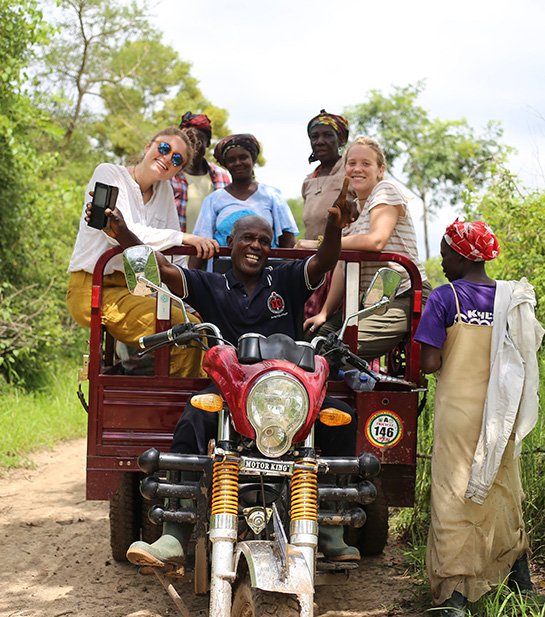This is a guest post from Eric Sorensen, CEO, and Co-Founder of Carbon Roots International
Originally posted on Your Mark On The World
What does a $500,000 award extension made possible by the generous support of the American people through USAID mean to Carbon Roots International? More predictable and efficient production of green charcoal for cooking in Haiti, with even less environmental degradation—and acceleration of our mission to create jobs, reduce deforestation, and improve lives in Haiti.
This infusion of capital into our organization is more than just a significant vote of confidence by the United States Agency for International Development (USAID), which is the main U.S. government agency working to end extreme global poverty and helping democratic societies worldwide to reach their potential. It also enables Carbon Roots to purchase, install, and operate new equipment to expand and automate our innovative process for turning agricultural waste into charcoal for cooking. It also puts Carbon Roots on the path to financial sustainability.
Fuel from Agricultural Waste Instead of Trees
Carbon Roots is already the largest charcoal producer in Haiti. While most of us in the United States associate charcoal with backyard barbecues and a pleasant, often festive, alternative to cooking in the kitchen, in Haiti charcoal is serious business. Nine of out 10 households there depend on charcoal or wood for all their cooking, and the reliance on tree wood has turned Haiti into one of the world’s most devastatingly deforested landscapes.
Carbon Roots has developed a process for producing green charcoal briquettes from agricultural waste instead of tree wood. The green charcoal has the added benefits of burning hotter and cleaner than traditional wood charcoal and costing less—without requiring Haitians to change their stoves or cooking methods.
Early in our development, Carbon Roots received valuable guidance and direction from Santa Clara University’s Miller Center for Social Entrepreneurship. As participants in their Global Social Benefit Institute (GSBI®) program, Carbon Roots was able to refine and improve our business plan, business model, and financial structures.
We sell green charcoal briquettes to customers directly, through wholesalers, and via independent women retailers that Carbon Roots recruits and trains. In addition to the health, cost, and environmental advantages of using green charcoal in their own homes, the women who become retailers learn valuable business skills—plus, they have the opportunity to earn incomes exceeding most other income-generating activities available to women in Haiti.
Taking the Green Charcoal Process to the Next Level
Although Carbon Roots is already helping to combat deforestation and boost the livelihoods of many Haitians—especially our network of independent women retailers—we still lacked a way to improve the efficiency and predictability of the first step of the green charcoal briquette production process: carbonizing the agricultural waste into charcoal dust. That’s where the USAID award extension comes into play.
Now Carbon Roots can afford to purchase and install one Big Char pyrolyzer unit from its Australian manufacturer, Pyrocal. This Big Char unit will serve as a proof of concept to potential investors, who will be needed to fund the purchase of the additional five units we will require for full-scale production.
The Big Char continuous carbonization technology:
- Automates previously manual steps
- Provides a steady source of heat that eliminates the need to sun-dry the charcoal dust
- Can operate even in rainy weather, a serious advantage in monsoon regions such as Haiti
- Produces less smoke than manual methods
Working with our Miller Center GSBI mentor, we were able to determine how best to proceed with acquiring the Big Char pyrolyzers—starting with a single unit for the pilot program, funded by the USAID grant; moving to full production with multiple pyrolyzers, funded through a mix of debt, lease, and a variable payment option (VPO) investment instrument; and eventually opening a second production facility, funded through a mix of debt and equity.
Our GSBI mentor also helped us refine our financial projections. We determined that two production facilities would produce sufficient internal cash flow to sustain one new factory every year for 10 years. That translates into saving 7 million trees and generating in excess of $50 million in income for poor Haitian women and their families.
As a result of its greater efficiency and ability to operate more days per year, the new Big Char pyrolyzer will allow Carbon Roots to increase our annual volume of green charcoal production while reducing both costs and emissions.
The demand for our green charcoal already outstrips our ability to supply it, and the problem isn’t lack of business resources, our business model, or resistance to our products. The limiting factor has simply been financial resources. We are extremely grateful to USAID’s Development Innovation Ventures for this generous extension award, which will enhance our ability to benefit our wide range of local stakeholders: farmers who monetize waste streams by selling agricultural residues to Carbon Roots; women charcoal retailers who enjoy higher incomes and greater autonomy; and poor Haitians who have access to a cleaner, cheaper, sustainable cooking fuel.

